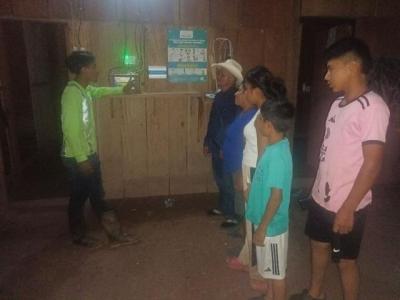
This summer, Quixote Center launched a new program in Nicaragua to help cacao producers in Waslala improve their livelihoods and overall quality of life. 40 members from the CacaoNica cooperative are participating in a pilot project installing solar panels and latrines in their homes, changing the lives of 200 people.
Located in the north Caribbean coastal region of Nicaragua, Waslala is currently not connected to the country’s electric grid. Families have been burning candles, using battery charged lamps and paying money every day to charge their phones and other devices, including devices used to improve their cacao crop. Their homes are not connected to any sewage system and most do not have a proper latrine, affecting the health and the dignity, as well as the livelihoods, because it impacts organic certification, of these cacao-producing families.
Working in collaboration with Green Empowerment and PeaceWorks, we are pleased to share that CacaoNica is implementing the project activities exactly as planned:
-
Every participating family received training on proper maintenance and use of the systems
-
100% of solar panels are installed and operational
-
60% of latrines are installed (the remaining 40% will be completed by early December 2025)
Participating families are already feeling the impact of these energy and sanitary systems in their homes. Our partners report that:
-
Families can save up to 200 cordobas per day (about $5 US) on energy costs
-
Producers can work longer hours and better conserve their products
-
Schoolchildren can do their homework after dark
-
Reduction in soil contamination from the latrines enables producers to organically certify their land with Rainforest Alliance and sell their cacao beans at a higher price.
There are many indirect impacts of this project as well such as the empowerment of youth within the CacaoNica cooperative who received training to become solar panel maintenance technicians and can now offer their services to the community. While having clean and accessible latrines allows family members with disability to have more autonomy and independence. Better health and hygiene are essential for them to live a dignified life.
Furthermore, the project requires every participating family to contribute a share of the installation costs, representing 30% for the solar panel system and $100 US for the latrine. Other selection criteria include: being loyal members of the cooperative, paying their dues and having a strong capacity for production. In return they receive solar panels that have a life cycle of 25 years and a battery of 5 years of utility. All parts and accessories are sold in downtown Waslala to guarantee timely maintenance of this equipment.
Quixote Center will be traveling to Nicaragua in February 2026 with PeaceWorks and will get a chance to visit the CacaoNica cooperative and some of the families who are participating in this pilot project. We look forward to meeting with cacao producers and learning directly from them how this initiative is transforming their lives.



Comments
Nancy Rosebaugh, NC (not verified)
What an encouraging report! This project sounds well thought out; it involves learning and teaching new skills as well as serving the community admirably. What a gift to have new energy independence and to have a product that can be proudly offered in the global market:-)
Quixote Center (not verified)
Thank you! We are very encouraged and excited about this project and future similar work.
Michael Toner (not verified)
This sounds like a wonderful project. With the Nicaraguan government's hostility toward outside assistance, the Church and NGO's, I would like to know how this project has been possible.
Quixote Center (not verified)
Thanks for your comment. It took us quite a long time to figure out who we could work with in Nicaragua. Our current partnerships with Green Empowerment and Peaceworks, together with CACAONICA cooperative, seems to be the right fit. Since CACAONICA is a cooperative and not an NGO, they are not subject to the same government controls.